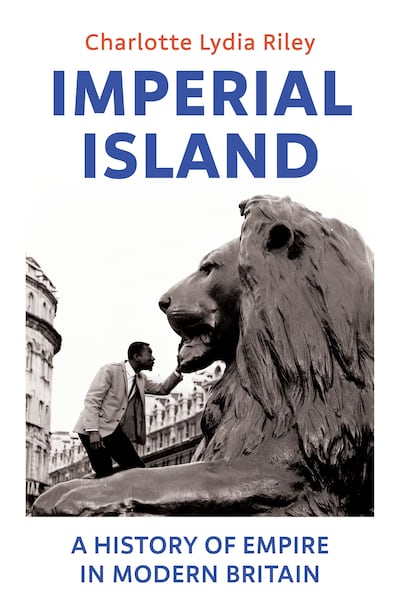In 1959, the BBC Caribbean Service produced a guide for prospective migrants to the United Kingdom. It included advice to be polite and forbearing with “white British people”, explaining much of the prejudice they experience will be due to ignorance: “I knew a Barbadian who was asked, in all seriousness, if the people in his country lived in houses or if they lived in the jungles and, also, if he had ever worn clothes before he came to England.”
Recounting the disturbing advice in her new book, author and historian Charlotte Lydia Riley writes these “sorts of questions are presented as deriving not from ingrained colonial racism, but from an imbalance of information: their knowledge of your country is much less than your knowledge of theirs”.
Imperial Island: A History of Empire in Modern Britain takes a deep-dive into the legacy of colonialism in Britain today, whether in the form of far-right groups like the National Front, or a bus company in Bristol in the sixties which faced a boycott after refusing to employ Asian or African drivers and conductors (the general manager even defended the policy, stating “the labour supply gets worse if the labour force is mixed”).

As various British colonies gained independence from the 1940s onwards, the UK’s foreign policy aspirations still appeared stuck in the country’s imperial past.
The media played an important role in perpetuating such myths, with the 1956 Suez invasion facilitated by papers such as the Daily Mail and Daily Mirror slandering then Egyptian president Gamal Abdel Nasser by making misleading comparisons with Adolf Hitler:
“One way that the Suez Crisis was embraced and amplified in Britain was through the use of analogies comparing Nasser to fascist figures, and discounting any peace talk as ‘appeasement’.," writes Riley. Nevertheless, there were mass anti-war protests in Britain against the invasion of Egypt.

Riley writes the Suez Crises was perhaps the beginning of the end for the empire: “a moment when even those who had once been proud of British imperial power were forced to concede that the nation was no longer the dominant international force; the United States and the USSR between them had put paid to that idea once and for all when they came together, despite their Cold War, to condemn British actions at the UN, thus forcing its humiliating withdrawal”.
But while the empire was on the wane, migration from the colonies to Britain was growing. Following the bloody aftermath of the partition in India and Pakistan in 1947, one migrant from the Subcontinent recalled “people were so unused to seeing Indian families that they would stop on Oxford Street to stare and point”.
In 1949, the British Nationality Act was passed, and in “one fell swoop, almost every inhabitant of the British Empire (or the former British Empire, in the case of India, Pakistan and Sri Lanka) was formally granted the right to live and work in the United Kingdom with no further paperwork required”.

In later decades, as migration from the Commonwealth countries swelled, entry into the erstwhile metropole became harder. When in 1968 Kenya began a policy of “Africanisation”, curtailing non-citizen’s right to trade and do business, thousands of Kenyan Asians began migrating to Britain. An estimated 190,000 Kenyan Asians were entitled to a British passport.
Riley writes how the Labour government “rushed through an updated Commonwealth Immigration Act”, extending controls on immigration to anybody whose parent or grandparent had not been born in, or was not a citizen of the UK: “Those travelling to Britain found themselves stripped of citizenship, sometimes in mid-air”.
The empire was not merely a physical entity with borders stretching across distant lands, but rather a state of mind, both for the colonialists and those they ruled over. This colonised mindset persisted long after the empire crumbled, its tentacles spreading into every nook and crevice of the British Isles, whether it be xenophobic attitudes towards migrants, racism within the police or interventionist foreign policy.
To investigate such a multilayered legacy is no walk in the park, but Riley’s prose flows smoothly, connecting the dots to give the reader the wider picture. For anyone curious about Britain’s colonial legacy in the modern era, Imperial Island will certainly be an eye-opener.

